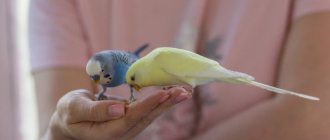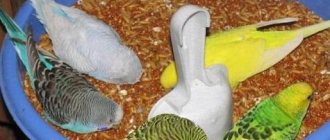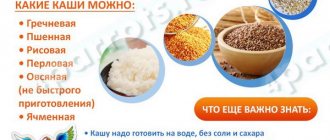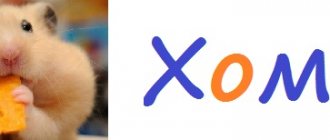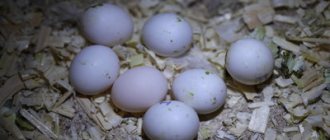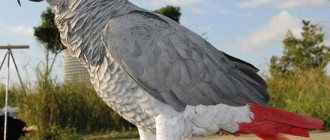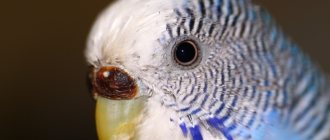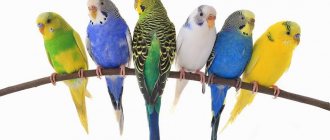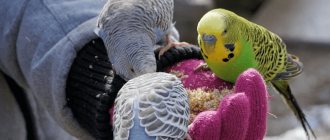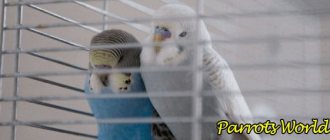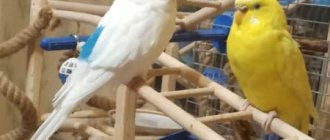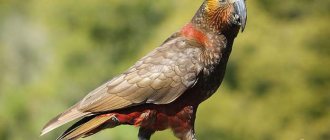Budgerigars are considered popular pets, as they delight owners with pleasant singing, communication and beautiful appearance. When buying a bird, it is important to choose the right cage and toys for it and also find out what parrots eat.
It is important to pay attention to the correct diet, which affects the appearance and health of the bird. It is recommended to use not only high-quality store-bought mixtures, but also to pamper the bird with fruits, herbs, berries, vegetables or nuts.
What do wavy birds eat?
The diet is varied. Parrots love to eat a variety of foods. The diet includes not only different types of grains, but also fruits, berries and grass.
Regime and proper nutrition are the key to the beauty, health and longevity of a budgie, so it is not recommended to skimp on it.
For an adult bird, 1 to 2 teaspoons of grain mixture is enough, but the bird must have access to minerals, herbs or other useful supplements every day.
The base is grain, and the rest of the products are additives.
What food do you give your parrots?
I make it myselfFrom the store
To provide your pet with proper nutrition, simple rules are taken into account:
- Do not give the bird a single daily portion;
- Only fresh ingredients are used, so residues must be removed in a timely manner;
- A drinking bowl must be installed near the feeder, allowing the bird to always have access to water.
Sometimes wavy fish, for various reasons, refuse to eat a certain brand of food, and this usually indicates the presence of some additives, so the mixture will have to be replaced.
Basic food at home
It is represented by grain mixtures, which serve as the basis for the bird’s nutrition. The stores offer many varieties of such feeds, offered by domestic or foreign companies. Due to their increased metabolism, parrots quickly digest grain.
It is recommended to choose a mixture that includes at least 6 grain crops. If you lack experience, you should not make food yourself, as there is a high probability of harming the health of the bird. Therefore, it is advisable to buy it ready-made, but in reliable and sealed packaging, and not by weight.
The basis of the diet includes the following components:
- millet, which can be red, black, yellow or white, and makes up approximately 70% of the total daily diet;
- oats, which take up 10% of the daily requirement;
- seeds, which include flaxseed, sunflower, hemp or canary seed, as well as wheat.
It is not recommended to add millet to the diet, which does not have a shell that prevents oxidation, so there is a high probability of harming the health of the bird.
What fruits and vegetables to feed
When creating a balanced diet for your bird, you should not forget about fruits and vegetables.
They must be given only in their pure form, so they are first washed with water.
Only seasonal vegetables and fruits are selected, which do not contain chemicals or harmful additives.
It is forbidden to give foods with rot or mold, as their consumption causes serious diseases in birds.
The following vegetables and fruits are ideal for parrots
- feed carrots contain a lot of carotene, and they can be given whole or grated, and they also go well with boiled eggs;
- melon;
- pumpkin and seeds, which are pre-ground;
- cucumbers, which have a positive effect on metabolism, and are ideal if the bird is overweight;
- tomatoes containing carotene, but only ripe tomatoes that do not contain the alkaloid should be given;
- white cabbage, and the leaves can be fed whole or torn into small pieces;
- beets containing fiber, vitamins and sugar;
- green peas or beans, but only fresh and soft legumes are selected;
- Krasnodar pepper, which contains many nutrients, and it is also advisable to give pepper seeds;
- apples, which can be given daily;
- tangerines, oranges and other citrus fruits, which are not only useful due to vitamin C, but also incredibly tasty, but it is not recommended to overdo it with them;
- pears are a sweet treat, but they should be given once a week;
- bananas are allowed in limited quantities, and they must also be given exclusively peeled;
- peaches or apricots, but they must be ripe.
- Grapes can be given to a parrot in certain doses.
It is allowed to give kiwi once a month to increase immunity, but without the skin.
Nuts
It is allowed to add nuts to the diet of budgies, but hazelnuts or walnuts are chosen for this. Peanuts are not recommended for wavy animals. Nuts can be given to the bird once every 2 weeks, since they are represented by excessively fatty foods.
The nuts are first cleaned of shells and husks, and it is also advisable to cut them to make sure there are no worms, mold or black spots.
Porridge
Cereals are healthy foods for birds. They allow you to saturate the body with useful components. Therefore, it is allowed to periodically give porridge, which ensures normalization of metabolism.
It is allowed to make porridge from buckwheat, rice, beans or other crops. You can give them to parrots separately or together. Porridges are boiled exclusively in water, since milk is prohibited. You cannot add salt or sugar, and the finished product can be stored in the refrigerator for no more than two days.
Greenery
It is very useful for a bird to eat greens. It improves the nutrition of the wavy, and is also considered the main component of the bird’s diet.
Greens are a source of nutrients and also strengthen the immune system.
It is advisable to give your parrot lettuce, chicory, spinach, clover, dandelion, carrot and beet tops, as well as plantain. It is prohibited to include potato or tomato tops, dill, bay leaves or decorative flowers in the diet.
Wooden branches
People who just got a wavy do not know whether they can be given twigs. In fact, they must be present in the birds’ diet.
The advantages of this diet supplement include:
- twigs are used not only as food, but also as a beak cleaner;
- improves the condition of the claws;
- The twigs contain important microelements and fiber, which has a positive effect on metabolism.
The most suitable branches are maple, aspen, alder and birch. It is allowed to use branches of fruit trees. Before placing the twigs in the cage, it is recommended to rinse them under hot water.
Sprouted grains
If you germinate grains, you will get soft, tasty and healthy grass. The grains themselves are nutritious food containing many vitamins and fiber. If wavy animals constantly consume sprouted grains, this will have a good effect on their immunity and metabolism.
The procedure for germinating grains is divided into successive stages:
- the largest and highest quality grains are selected;
- they are washed well with plain water;
- pour warm water overnight;
- repeated washing is carried out;
- clean grains are laid out on a plate and covered with pre-moistened gauze;
- the gauze is re-wetted every 4 hours;
- literally within 24 hours sprouts appear.
Grains with sprouted grass can be immediately given to a parrot, and they can be stored for no more than two days.
How to ensure high quality peanuts?
So, we have established that you can feed your parrots peanuts as long as they are of high quality. But how do you know if the peanuts are of high quality?
First, make sure your peanuts are safe for human consumption. Second, choose a brand manufacturer. Commercial producers test all their peanuts for aflatoxin before sale. If they do not exceed the levels allowed by the USDA, they do not sell them in stores. Avoid peanuts that are not sold under brand names, as well as peanuts that are sold in bulk.
Despite some rumors that roasting destroys aflatoxin, this is not true. You can feed your parrot roasted peanuts here and there, but again, make sure they are high quality. The idea that roasting destroys this toxin is just a rumor.
Supplements and vitamins
They are sold ready-made in pet stores. The main such additives include:
Chalk. It is an ideal source of calcium, the deficiency of which in birds worsens the condition of their claws and beaks. Chalk is sold in the form of special toys or in grated form. You have to use exclusively specialized purified chalk, so it is forbidden to give the wavy construction chalk, which contains numerous impurities and additives that are harmful to the bird.- Eggshell. It should be washed well, and it is recommended to give it in crushed form. It contains a lot of magnesium, sulfur, calcium and iron, so it is an ideal source of vitamins for a small bird.
- Bone flour. It is offered in grated form at every pet store and also contains calcium and phosphorus. It is often used by manufacturers of feed mixtures, so if you buy a high-quality product, then there is no need to additionally buy bone meal.
Pet stores offer customers specialized vitamins and minerals. They are often small toys that are attached to the walls of the cage. Parrots eat these supplements while playing, which has a positive effect on their health and appearance.
Water
Budgerigars should always have free access to clean water. It is poured into special drinking bowls, available on the market in various shapes and sizes. The water is changed daily, otherwise it quickly becomes polluted. But not all water is suitable for birds.
It is recommended to give the birds boiled liquid. Raw water is allowed only if it is previously well purified and therefore does not contain harmful components. It is allowed to use mineral water with gases, which is pre-filtered. This water contains potassium, magnesium and sodium. It is allowed to pour a decoction of chamomile or rosehip into the drinking bowl.
Wavys can be given a small amount of freshly squeezed juice, which is mixed with water, and lemon or apple juice without additives is usually used.
Is it possible to give food to people?
During lunch and dinner, people notice that the birds show interest in various unusual products, such as eggs, cottage cheese and even meat. It is allowed to include animal products in the diet, but rarely and in small quantities.
During molting or nesting, it is allowed to increase the amount of protein food, giving it every day.
Acceptable products from the common table include:
- low fat fermented milk cheese;
- boiled eggs;
- fish fat;
- skim cheese.
It is allowed to give a small amount of crackers, but fresh bread is prohibited. This is due to the presence of yeast, sugar, salt and milk. Rusks go well with a mixture of carrots and eggs. But it is advisable to give such components no more than twice a month.
Parrot nutrition
The natural habitat of parrots is tropical places, mainly in Australia, Africa and South America. There they feed on the seeds of cereal plants, herbaceous and woody plants, and fruits.
The “frequent and favorite” product in a bird’s diet always depends on its breed and the exact territory in which it lives. Large birds require a high energy value of food; small birds need only a couple of fruits of a fruit tree per day.
Every day, exotic birds fly a huge number of kilometers in order to find food. The constant lack of food has made some people picky about food. These breeds include the wavy breeds, which are loved by poultry farmers, cockatiels and several other domesticated breeds.
What products are prohibited?
There are some foods that should not be given to budgies, otherwise it can lead to illness or death of the bird.
These include:
- Salt . Birds simply cannot process this spice, so even a small amount of salt can lead to dehydration and death.
- Spices or herbs . They cause diseases and other health problems. Excessive consumption of any seasoning causes the instant death of the wavy.
- Milk or dairy products . To digest milk, the body must have special enzymes that are absent in birds. Such products additionally contain a lot of fat. The only exception is low-fat cottage cheese.
- Mushrooms . They negatively affect the digestive system of birds.
- Chocolate products . They contain cocoa as well as large amounts of sugar. These components excite the nervous system of birds.
- Potatoes, eggplants or radishes. They are difficult for birds to digest and also do not bring any benefit to the body.
It is necessary to tell all family members about the optimal diet in order to prevent a situation where a child or an elderly person feeds a bird with prohibited foods.
Why give a parrot nuts?
Lipids occupy an important place in the diet of parrots. The need for them increases in winter, when the bird needs additional energy to warm its body. A good source of bioenergy for parrots are the fats that are included in the product. They contain a number of useful microelements and vitamins that improve the health of birds.
The calorie content of lipids is higher than that of proteins or carbohydrates. They are the main source of energy and are involved in the production of a number of hormones, vitamins and enzymes. Thanks to these natural organic compounds, polyunsaturated fatty acids enter the stomach. A deficiency of them in the parrots’ menu causes metabolic disorders, and an excess provokes the appearance of excess weight. Kernels should be fed in moderation.
